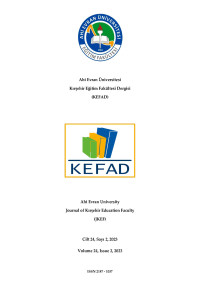Abstract
Bu çalışma, Türkiye'deki lisansüstü tezlerde sanal gerçeklik (SG) teknolojisine ilişkin özellikle eğitim alanındaki araştırmaları çeşitli değişkenler açısından incelemeyi amaçlamıştır. Bu kapsamda “sanal gerçeklik” anahtar sözcüğünü kullanarak Yükseköğretim Kurumu (YÖK) tez merkezi veri tabanındaki tezlere (n=194) ulaşılmıştır. Bu tezlerden “Eğitim ve Öğretim” (n=34) alanında yer alan tezler araştırmaya dahil edilmiştir. Tezler nitel araştırma yaklaşımlarından biri olan temel yorumlayıcı desen kullanılarak incelenmiştir. Tezlerin konu alanları Fen Bilgisi Eğitimi, Öğretmen Yetiştirme, Özel Eğitim, Dil Öğretimidir. Geliştirme sürecinde kullanılan yazılımlar, 2B ve 3B tasarım programları, 3B işlev kitaplıkları, etkileşimli arayüz tasarım yazılımları ve bilgisayar programlama dilleri olmak üzere dört temel kategoriye ayrılmıştır. Uygulama sürecinde en çok kullanılan donanımlar VR gözlükleri ve dokunsal cihazlar/uzaktan kumandalardır. Tezlerin yaklaşık yarısında yeni bir VR ortamı tasarlanmış ve geliştirilmiştir. Ayrıca tezlerin çoğunda akademik başarı, beceri geliştirme, tutum ve motivasyon gibi öğrenme süreçlerinde çok önemli değişkenler açısından VR lehine pozitif ve anlamlı farklılıklar bulunmaktadır. Söz konusu tezlerde üretilen VR ortamlarının yeniden kullanılabilmesi ve bu kullanıcı deneyimleri raporlanarak geliştirilen ortamların etkinliğinin doğrulanması sağlanabilir. Yeni bir SG ortamı geliştirmenin maliyeti göz önünde bulundurulduğunda, bu hem araştırma hem de uygulama süreçlerine ve dolayısıyla yaygınlaştırılmasına büyük katkı sağlayacaktır.
References
- Symonenko, S.V., Zaitseva, N.V., Osadchyi, V.V., Osadcha, K.P., & Shmeltser, E.O. (2019, March). Virtual reality in foreign language training at higher educational institutions. In: Kiv, A.E., Shyshkina, M.P. (eds.) Proceedings of the 2nd International Workshop on Augmented Reality in Education (AREdu 2019), Kryvyi Rih, Ukraine. CEUR Workshop Proceedings 2547, 37–49.
- Turgut, Y.E., & Denizalp, N.V. (2021). Trends in Virtual Reality Research in Education in Turkey: A Content Analysis. Erzincan University Journal of Education Faculty, 23(2), 533-555. https://doi.org/10.17556/erziefd.844639 Ververidis, D., Migkotzidis, P., Nikolaidis, E., Anastasovitis, E., Papazoglou Chalikias, A., Nikolopoulos, S., &
- Kompatsiaris, I. (2022). An authoring tool for democratizing the creation of high-quality VR experiences. Virtual Reality, 26(1), 105-124.
Abstract
This study aimed to examine the research on virtual reality (VR) technology, especially in educational research, in terms of various variables in postgraduate dissertations in Turkey. In this context, employing the keyword “virtual reality”, we reached the dissertations (n=194) in the dissertations center database of the Council of Higher Education (CHE). Among these dissertations, which are in the field of “Education and Training” (n=34) were included in our research. These dissertations were examined by using the basic interpretive design, one of the qualitative research approaches. The subject areas of the dissertations are Science Education, Teacher Training, Special Education, Language Teaching. The software used in the development process is divided into four basic categories including 2D and 3D design programs, 3D function libraries, interactive interface design software, and computer programming languages. The hardware mostly used in the implementation process are VR glasses and haptic devices/remote controls. In approximately half of the dissertations was designed and developed a new VR environment. Moreover, in the majority of the dissertations, there are positive and significant differences in favor of VR in terms of very important variables in learning processes such as academic achievement, skill development, attitude, and motivation. In this case, it can be ensured that the VR environments produced from these dissertations can be reused and the effectiveness of the developed environments can be confirmed by reporting these user experiences. Considering the cost of developing a VR environment, this will make a great contribution to both research and application processes and thus dissemination.
References
- Symonenko, S.V., Zaitseva, N.V., Osadchyi, V.V., Osadcha, K.P., & Shmeltser, E.O. (2019, March). Virtual reality in foreign language training at higher educational institutions. In: Kiv, A.E., Shyshkina, M.P. (eds.) Proceedings of the 2nd International Workshop on Augmented Reality in Education (AREdu 2019), Kryvyi Rih, Ukraine. CEUR Workshop Proceedings 2547, 37–49.
- Turgut, Y.E., & Denizalp, N.V. (2021). Trends in Virtual Reality Research in Education in Turkey: A Content Analysis. Erzincan University Journal of Education Faculty, 23(2), 533-555. https://doi.org/10.17556/erziefd.844639 Ververidis, D., Migkotzidis, P., Nikolaidis, E., Anastasovitis, E., Papazoglou Chalikias, A., Nikolopoulos, S., &
- Kompatsiaris, I. (2022). An authoring tool for democratizing the creation of high-quality VR experiences. Virtual Reality, 26(1), 105-124.
Details
| Primary Language | Turkish |
|---|---|
| Subjects | Other Fields of Education |
| Journal Section | Review |
| Authors | |
| Publication Date | August 31, 2023 |
| Published in Issue | Year 2023 Volume: 24 Issue: 2 |


